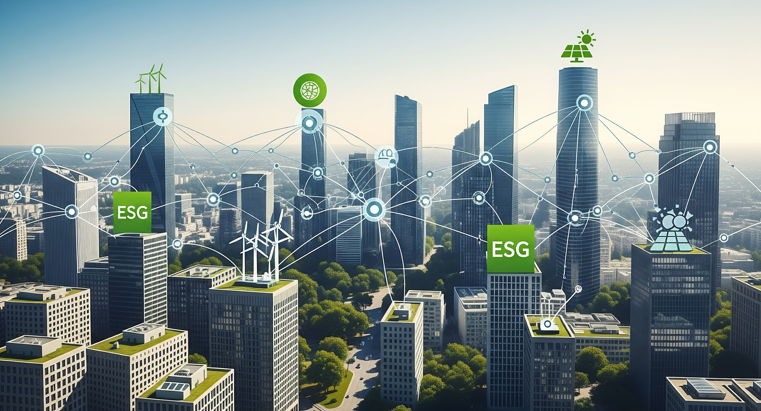European Startups Drive Carbon Market Innovation Through ESG Tokenization on Ethereum

Environmental, Social, and Governance (ESG) tokenization is revolutionizing sustainable finance as European startups harness blockchain technology to transform carbon markets. With the current ETH price USD trading at competitive levels and providing a robust foundation for smart contract deployment, innovative companies across the Netherlands and Scandinavia are launching groundbreaking projects that tokenize carbon credits and enable transparent green asset tracking. This technological evolution is addressing critical challenges in carbon market liquidity, transparency, and accessibility while creating new opportunities for sustainable investment.
The Growing ESG Tokenization Market
By 2030, tokenized assets are predicted to have a $16 trillion worldwide market capitalization, with real-world asset tokenization poised to transform sectors including carbon credits, real estate, and equities. ESG assets will exceed $53 trillion by 2025, creating unprecedented demand for transparent, efficient investment mechanisms that blockchain technology can uniquely provide.
ESG asset tokenization refers to the process of issuing digital tokens that represent specific rights to the underlying ESG assets. These tokens can represent ownership, economic interest, or investment rights in sustainable and impact-driven assets such as green bonds, renewable energy projects, and carbon credits.
Ethereum’s Role in Carbon Market Innovation
The Ethereum blockchain has emerged as the preferred platform for ESG tokenization due to its mature smart contract capabilities and extensive developer ecosystem. The carbon credit ecosystem on the Ethereum blockchain brings more liquidity, transparency, accessibility, and standardization to carbon markets. This ecosystem includes all stakeholders and a tokenization mechanism with clear minting and burning protocols (ERC20).
The largest and most well-known carbon pool utilizing the Toucan Protocol would be the Base Carbon Tonne (BCT) used by KlimaDAO. The bulk of carbon credits bridged by Toucan has gone to the BCT pool comprised of Ethereum Request for Comment 20 (ERC-20) tokens, demonstrating the platform’s practical implementation in carbon markets.
European Leadership in ESG Blockchain Solutions
Netherlands Innovation Hub
The Netherlands has positioned itself as a leading hub for blockchain and ESG innovation. Netherlands-based fintech Quantoz Payments (part of financial software firm Quantoz N.V.) has obtained a Dutch Electronic Money Institution license to issue MiCA-compliant euro and dollar stablecoins on the Ethereum blockchain. Its euro- (EURQ) and USD-pegged (USDQ) e-money tokens (EMTs) provide the regulatory foundation for broader ESG tokenization initiatives.
The Dutch blockchain ecosystem encompasses 85 top blockchain companies and startups in the Netherlands in 2025, with many focusing on sustainable finance applications. Carbon credit companies in the Netherlands are actively exploring tokenization solutions, including companies like AgroCCS and Carbify BV that are developing innovative approaches to carbon credit management.
Scandinavian Green Finance Leadership
Scandinavian countries have long been pioneers in environmental sustainability and are now leveraging blockchain technology to enhance their green finance initiatives. The region’s strong regulatory frameworks and commitment to environmental goals provide an ideal environment for ESG tokenization projects.
Tokenized Carbon Credits and Market Transformation
Web3 startups like Toucan and the AirCarbon Exchange are already driving innovation in the tokenized carbon credits space, creating practical applications that demonstrate the technology’s potential. These platforms enable fractional ownership of carbon credits, reducing barriers to entry for smaller investors and increasing overall market liquidity.
The tokenization process transforms traditional carbon credits into digital assets that can be traded, tracked, and verified on blockchain networks. This transformation addresses several critical challenges:
Enhanced Transparency and Traceability
Blockchain technology provides immutable records of carbon credit origins, verification processes, and ownership transfers. This transparency helps combat fraud and double-counting issues that have historically plagued carbon markets.
Improved Market Liquidity
Tokenization enables fractional ownership and 24/7 trading capabilities, significantly improving market liquidity compared to traditional carbon credit trading mechanisms. Investors can purchase portions of carbon credits rather than requiring full credit purchases.
Automated Compliance and Reporting
Smart contracts can automate compliance reporting and ensure that carbon credits meet specific environmental standards before tokenization, reducing administrative overhead and improving market confidence.
Green Asset Tracking Innovations
Beyond carbon credits, European startups are developing comprehensive green asset tracking solutions using Ethereum. These platforms enable monitoring and verification of various environmental assets, including renewable energy certificates, sustainable forestry projects, and biodiversity credits.
Thanks to tokenization, investors can access more transparent investment opportunities, and small projects can reach a much wider set of potential investors, democratizing access to green investments that were previously available only to institutional investors.
Major Industry Adoption and Validation
The legitimacy of ESG tokenization has been validated by major financial institutions. JPMorgan Chase & Co. is developing a new service to tokenize carbon credits and is partnering with a trio of carbon companies for an initial trial, demonstrating institutional confidence in blockchain-based carbon market solutions.
This institutional adoption provides validation for European startups developing similar solutions and suggests significant growth potential for the sector.
Technical Implementation and Standards
European projects are implementing sophisticated technical standards for ESG tokenization. White-label carbon credit marketplace products with asset tokenization features are highly cost-effective for businesses of all sizes looking to enter the ReFi and carbon offsets market, enabling rapid deployment of tokenization solutions.
The standardization of tokenization protocols ensures interoperability between different platforms and creates network effects that benefit the entire ecosystem.
Regulatory Landscape and Compliance
As of early 2025, there is no specific federal or provincial legislation directly addressing the tokenization of carbon credits. However, several key regulatory aspects are relevant, creating both opportunities and challenges for European startups navigating the evolving regulatory landscape.
European Union regulations, including the Markets in Crypto-Assets (MiCA) framework, provide clearer guidance for tokenization projects, giving European startups a competitive advantage in developing compliant ESG tokenization solutions.
Market Challenges and Solutions
Despite significant progress, ESG tokenization faces several challenges, including price volatility, regulatory uncertainty, and technical complexity. However, European startups are developing innovative solutions:
Price Stability Mechanisms: Integration of stablecoins and hedging mechanisms to reduce volatility impact on long-term ESG investments.
Regulatory Compliance Tools: Automated compliance systems that ensure tokenized assets meet evolving regulatory requirements across different European jurisdictions.
User Experience Enhancement: Simplified interfaces that make ESG tokenization accessible to non-technical investors and smaller organizations.
Future Outlook and Market Potential
The convergence of ESG investing demands, blockchain technology maturity, and regulatory clarity positions European startups at the forefront of a transformative market opportunity. As carbon pricing mechanisms become more widespread and ESG reporting requirements increase, tokenization solutions will become essential infrastructure for sustainable finance.
The integration of artificial intelligence, Internet of Things sensors, and satellite monitoring with blockchain tokenization creates comprehensive environmental asset tracking systems that provide unprecedented transparency and verification capabilities.
Conclusion
European startups in the Netherlands and Scandinavia are pioneering innovative ESG tokenization solutions that transform carbon markets through Ethereum blockchain technology. By creating transparent, liquid, and accessible carbon credit markets, these companies address critical environmental financing challenges while generating new opportunities for sustainable investment. As the Ethereum price stabilizes and regulatory frameworks mature, ESG tokenization represents a fundamental shift toward more efficient and transparent environmental finance mechanisms. The success of these European initiatives positions the region as a global leader in sustainable blockchain innovation, creating a foundation for scalable climate action through technology-enabled financial markets.





